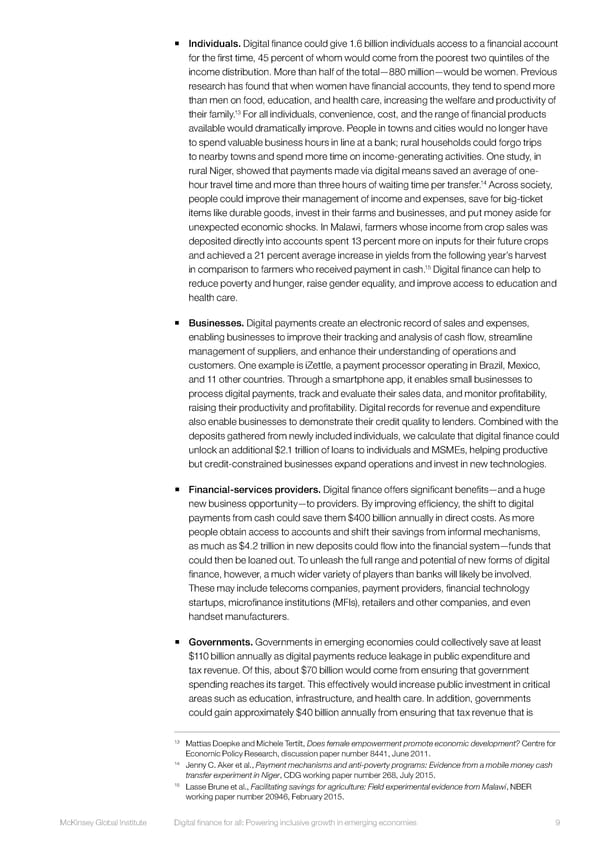ƒ Individuals. Digital finance could give 1.6 billion individuals access to a financial account for the first time, 45 percent of whom would come from the poorest two quintiles of the income distribution. More than half of the total—880 million—would be women. Previous research has found that when women have financial accounts, they tend to spend more than men on food, education, and health care, increasing the welfare and productivity of 13 For all individuals, convenience, cost, and the range of financial products their family. available would dramatically improve. People in towns and cities would no longer have to spend valuable business hours in line at a bank; rural households could forgo trips to nearby towns and spend more time on income-generating activities. One study, in rural Niger, showed that payments made via digital means saved an average of one- 14 Across society, hour travel time and more than three hours of waiting time per transfer. people could improve their management of income and expenses, save for big-ticket items like durable goods, invest in their farms and businesses, and put money aside for unexpected economic shocks. In Malawi, farmers whose income from crop sales was deposited directly into accounts spent 13 percent more on inputs for their future crops and achieved a 21 percent average increase in yields from the following year’s harvest 15 Digital finance can help to in comparison to farmers who received payment in cash. reduce poverty and hunger, raise gender equality, and improve access to education and health care. ƒ Businesses. Digital payments create an electronic record of sales and expenses, enabling businesses to improve their tracking and analysis of cash flow, streamline management of suppliers, and enhance their understanding of operations and customers. One example is iZettle, a payment processor operating in Brazil, Mexico, and 11 other countries. Through a smartphone app, it enables small businesses to process digital payments, track and evaluate their sales data, and monitor profitability, raising their productivity and profitability. Digital records for revenue and expenditure also enable businesses to demonstrate their credit quality to lenders. Combined with the deposits gathered from newly included individuals, we calculate that digital finance could unlock an additional $2.1 trillion of loans to individuals and MSMEs, helping productive but credit-constrained businesses expand operations and invest in new technologies. ƒ Financial-services providers. Digital finance offers significant benefits—and a huge new business opportunity—to providers. By improving efficiency, the shift to digital payments from cash could save them $400 billion annually in direct costs. As more people obtain access to accounts and shift their savings from informal mechanisms, as much as $4.2 trillion in new deposits could flow into the financial system—funds that could then be loaned out. To unleash the full range and potential of new forms of digital finance, however, a much wider variety of players than banks will likely be involved. These may include telecoms companies, payment providers, financial technology startups, microfinance institutions (MFIs), retailers and other companies, and even handset manufacturers. ƒ Governments. Governments in emerging economies could collectively save at least $110 billion annually as digital payments reduce leakage in public expenditure and tax revenue. Of this, about $70 billion would come from ensuring that government spending reaches its target. This effectively would increase public investment in critical areas such as education, infrastructure, and health care. In addition, governments could gain approximately $40 billion annually from ensuring that tax revenue that is 13 Mattias Doepke and Michele Tertilt, Does female empowerment promote economic development? Centre for Economic Policy Research, discussion paper number 8441, June 2011. 14 Jenny C. Aker et al., Payment mechanisms and anti-poverty programs: Evidence from a mobile money cash transfer experiment in Niger, CDG working paper number 268, July 2015. 15 Lasse Brune et al., Facilitating savings for agriculture: Field experimental evidence from Malawi, NBER working paper number 20946, February 2015. McKinsey Global Institute Digital finance for all: Powering inclusive growth in emerging economies 9
 DIGITAL FINANCE FOR ALL Page 19 Page 21
DIGITAL FINANCE FOR ALL Page 19 Page 21